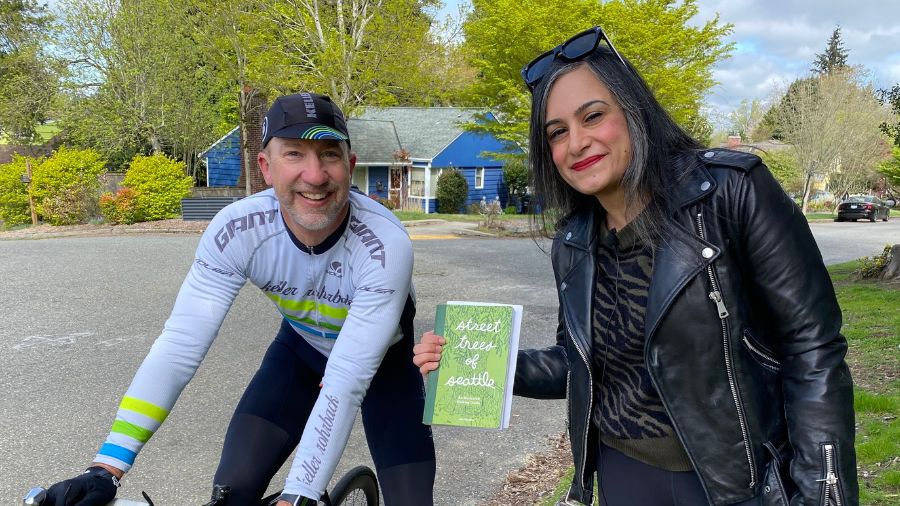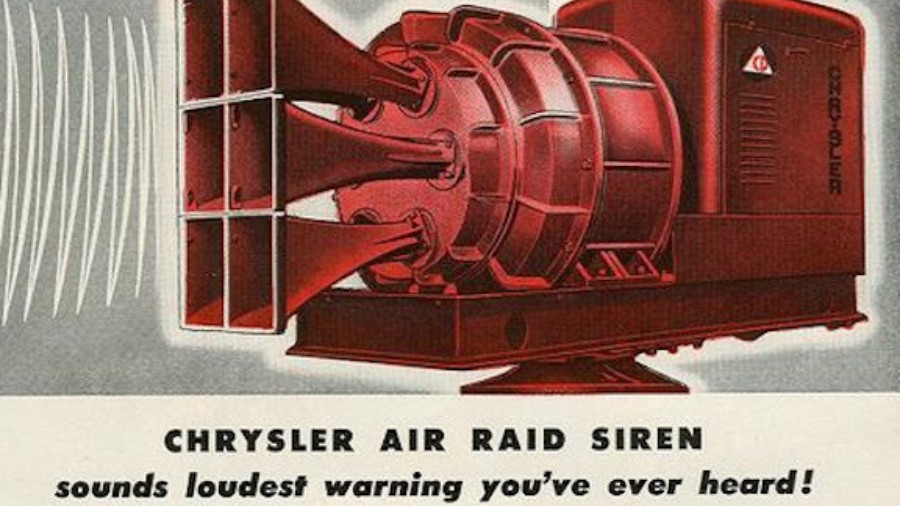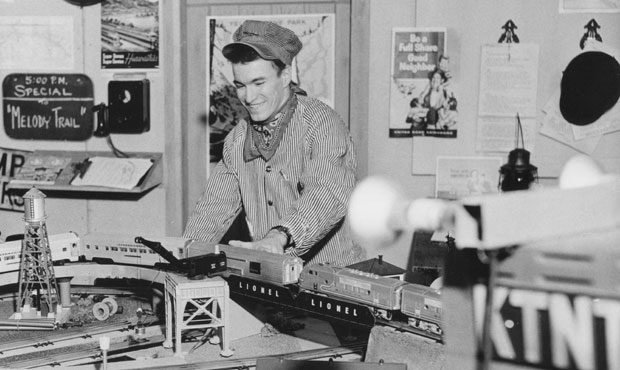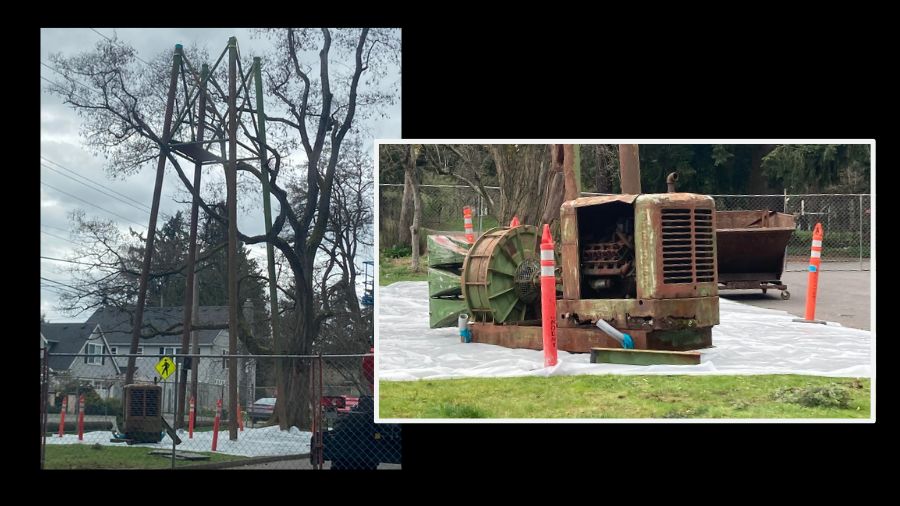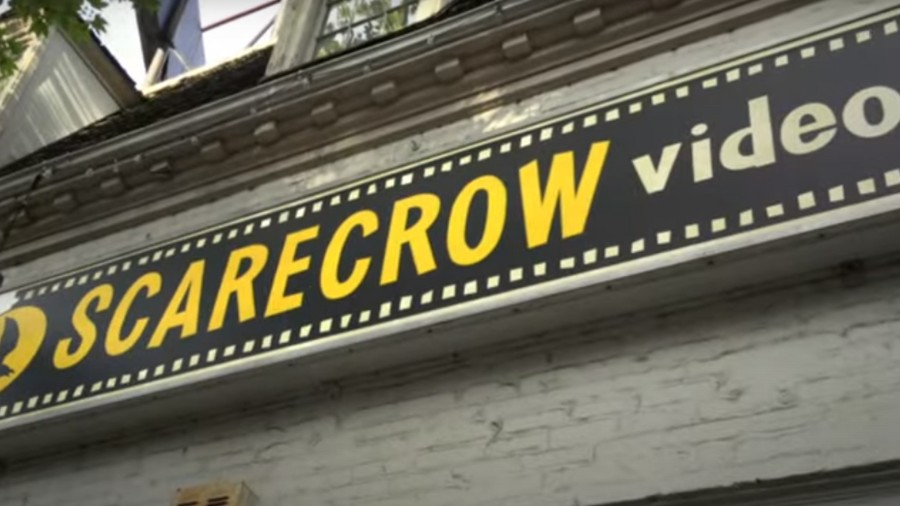J.P. Patches’ legacy lives on in the Pacific Northwest
Jul 22, 2022, 8:10 AM | Updated: 8:11 am
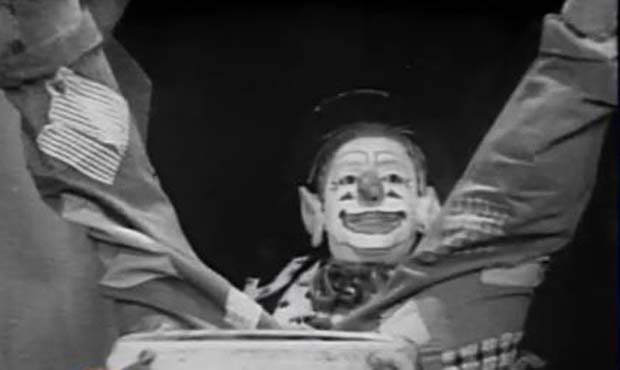
Chris Wedes, star of the long-running J.P. Patches program, passed away on July 22, 2012. (KIRO 7)
(KIRO 7)
Friday, July 22, 2022, marks the 10th anniversary of the death of Chris Wedes, longtime star of the J.P. Patches program on KIRO TV. Though he was a humble guy who’d probably reject the honor, it’s not an exaggeration to say that J.P. Patches, as portrayed by the late Chris Wedes, was the most popular person in the history of broadcasting in the Pacific Northwest.
J.P. Patches remains a local icon, with a product line at Archie McPhee’s, a massive following on Facebook, and a certain cultural presence around the Northwest that refuses to diminish.
Wedes passed away in 2012 at the age of 84. His program ran on KIRO TV from 1958 to 1981, which makes it one of the longest-running children shows on local TV anywhere in the United States. JP’s sidekick/girlfriend Gertrude was played by Bob Newman, who also played JP’s nemesis Boris S. Wart, and several other colorful characters. Bob Newman passed away in December 2020 after a long battle with multiple sclerosis.
Related: Unlocking the mystery of a Seattle theater
It’s not quite right to say that J.P. Patches was just a clown. There was more to J.P. than just the makeup and silly outfits, and more to what Wedes and Newman did in service to this community in their decades of playing those characters. When pressed about what it all meant, Wedes often downplayed his formidable talents as an entertainer, and downplayed the obvious impact that his show had on TV-watching kids in the Northwest.
And he never liked his rubber ears.
“J.P. has rubber ears, which I hate,” said Wedes in a 2010 interview, laughing a laugh that sounded more like J.P. than Chris. “I never should have put rubber ears on. For one thing, they don’t fit right and clowns normally don’t have rubber ears. I’ve been told that a million times by professional clowns. ‘Real clowns don’t have rubber ears.’ And I say, ‘Well I’m not a real clown. I’m J.P. Patches. I’m different, I can get away with it. Around my mouth, I have little swirls of black. The lips are outlined in black. The eyebrows are square. I have little triangular teardrops under my eyes, but it doesn’t mean I’ve been crying.”
The J.P. Patches program premiered the first week of February 1958 when KIRO TV came on the air. The show was set in a shack at the city dump. “J.P.” was short for Julius Pierpont, and, as the backstory goes, Patches was a retired clown from the Dingling Brothers Circus. He had no visible means of support, but he held forth every morning and many afternoons from his shack, offering up the requisite cartoons, hosting visits from Officer Friendly, and reminding his viewers — the Patches Pals — to follow the rules of the Patches Pal Check List:
- Mind mommy and daddy
- Wash hands, face, neck and ears
- Comb hair
- Brush teeth
- Drink milk
- Eat all your food
- Say your prayers
- Share your toys
- Put toys away
- Hang up clothes
In between cartoons and guests, Patches and Newman (who joined the show around 1960) performed impromptu, unrehearsed, unscripted comedy bits. Newman was most often seen as Gertrude or Boris, but he also played Ketchikan the Animal Man, handyman Leroy Frump, bizarre one-eyed creature Ggoorrsst the friendly Frple, Miss Smith of Miss Smith’s Delivery Service, the Swami of Pastrami or, during the holiday season, Santa Claus.
If you didn’t grow up in the Pacific Northwest or never ran across J.P. and Gertrude in their post-TV career doing personal appearances, you might be reading this and thinking that this was no big deal, and nothing special. The town where you grew up probably had a program or two that even seemed similar to what’s been described here so far. But what you had wasn’t similar; we truly had something special here in Seattle.
It’s hard to overstate the fact that J.P. Patches — the character, the show, the spirit, the way of life — was far greater than the sum of its parts. This was not clear to Chris Wedes at the time the show was still on TV, but ultimately, I think, Wedes came to better understand the impact he’d made on this region.
Wedes and Newman both kept working at KIRO TV behind-the-scenes after the show went off the air in 1981. But then, the pair experienced something of a renaissance as J.P. Patches and Gertrude beginning in the early 1990s. Suddenly, they were everywhere — store grand openings, pledge drives on public TV, and birthday parties. Maybe it was partly baby boomer nostalgia, but there was something about the pair that transcended the medium of television. They became more popular and more visible without having to be on TV every day, which is pretty bizarre.
Public love for the pair culminated in 2008, when a bronze statue of J.P. and Gertrude was dedicated in Fremont, with a few thousand people on hand for the ceremony. Pat Cashman hosted, and notable Patches Pals spoke, including Mayor Greg Nickels, Representative Jim McDermott and Governor Christine Gregoire.
I was fortunate to know Chris Wedes for almost 20 years, and I can personally report that Chris in person, out of the makeup, working or just hanging out, was even cooler than the character he played.
When I interviewed Chris for a Seattle Post-Intelligencer podcast in 2010, he’d already been diagnosed with myeloma, and was undergoing regular kidney dialysis. In spite of the discomfort and inconvenience, Wedes was still busy with family in Edmonds and Issaquah, and still putting on the makeup for occasional public appearances as J.P. Patches.
The makeup that made Chris Wedes look like J.P. Patches was not an easy task to put on or to takeoff.
“It takes about a half an hour to put my makeup on and it takes just as long to take it off. And I take the makeup off with mineral oil and paper towels,” Wedes said. “And I never get it off all the way around my eyes. There’s always white [leftover] around my eyes.”
It was obvious that in spite of the work required to get ready for an appearance, Chris Wedes loved being J.P., and that he genuinely appreciated the love shown to him by Patches Pals. I like to think that maybe the love that the Patches Pal were showing at those appearances and the statue dedication helped Chris as be battled the illness that ultimately took his life in 2012.
“You know, it’s amazing. I never thought after all these years that people would love the program and the character so much that they would have me to their homes for birthdays, celebrations,” Wedes said.
“They talk about the show, and they tell me about things [that happened on the show] that I don’t remember. They’d tell me about incidents [on the show] and where they were when they saw something,” Wedes added, almost in disbelief.
“It’s amazing. I mean, they watched it day and night. It was almost like a cult program. It was more than a kids’ show, it really was,” Wedes continued, and then theorized about what made the show attractive. “I never talked down to kids. And I was never a goody-two-shoes. Sometimes, there’s a little element of naughtiness to JP that the kids kinda liked.”
Grownups liked the show, too, since Wedes and Newman often effortlessly folded offhand pop culture references and knowing nods to local people and places into the dialog of their improv skits on the show.
It was a certain subset of Patches Pals who’d become grownups who most deeply touched Wedes in the later years of his life. Through emails, Wedes received countless messages from Patches Pals who’d found comfort and solace in the show years earlier.
“Some of these kids were mistreated quite badly you know,” Wedes said. “And I get these emails, and they tell me, they said, ‘The one salvation was you. You were there in the morning, and I could count on you. And I’d come home in the afternoon, and you were there.’ I’m gonna start crying now thinking about it.”
That’s the kind, thoughtful and gracious J.P. Patches that I think of the most, sitting there on a hot July day in his living room, sipping ice water brought by his wife Joanie, and obviously caring deeply about the Patches Pals who’d needed him the most, and who, it was abundantly clear, he had never let down.
As we sat talking that day, those weren’t the painted-on triangular clown teardrops on Chris Wedes’ face. These were the real ones.
You can hear Feliks every Wednesday and Friday morning on Seattle’s Morning News with Dave Ross and Colleen O’Brien, read more from him here, and subscribe to The Resident Historian Podcast here. If you have a story idea or questions, please email Feliks here.
Follow @https://twitter.com/feliksbanel


